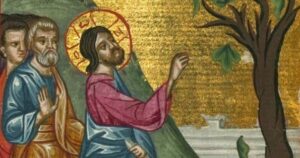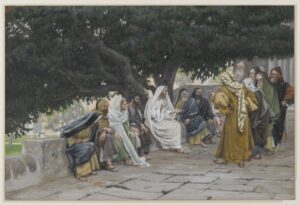Why, you ask, are we having Matins (usually served in the morning) in the evening? Why do we have Vesperal Liturgy of the Presanctified Gifts (obviously an evening service) in the morning? I’m sorry you asked.
Here’s my guess: it’s because our Matins hymn “The Bridegroom cometh in the middle of the night” was written in the monasteries, where Matins is a middle of the night service. (When I was on Athos, I remember the dreaded knock on my door before 3 a.m.: “Pater, the services have begun.”) It doesn’t make sense to sing that hymn in the morning light. So for this Week Matins gets pushed back to the evening before. That leaves Vesperal Liturgy with nowhere to go except in the morning.
Does that make sense? I didn’t think so. If anyone has a better explanation I’d be grateful if you’d share it.
CDs of the lovely music of Archangel Voices are available from http://www.archangelvoices.com
This hymn, sung on four evenings this week, derives from our Tuesday morning Gospel reading – about the ten bridesmaids waiting for the bridegroom who arrives late, at midnight. Just so, in the middle of the night before Pascha morning, Christ the Bridegroom will rise from death to be “married”, united with His Bride the Church, with us His people, forever.
To everyone’s surprise, on Palm Sunday Christ went not to challenge the Roman governor, the political authority, but instead to the Temple, the center of Jewish religion. Seeing men changing money and selling animals at exorbitant prices, He overturned their tables and drove them out.”It is written,” He said to them “My house will be called a house of prayer, but you are making it ‘a den of robbers.” Matthew 21:13 Very carefully phrased, since He was not yet ready to be arrested. People must have wondered: Does He mean My house? His house? Who does He think He is?
Who indeed?
Jesus healed a few people, then He and His disciples went back to Bethany. After peoples’ eager anticipation on Palm Sunday morning… this is it? this is all?
Gospel reading: Matthew 21:18-43
In tonight’s Gospel it is already Monday morning. Jesus and His disciples had stayed overnight with Martha, Mary and Lazarus. It says “He was hungry”. (For once, did Martha not fix breakfast?) Jesus saw a fig tree with no fruit on it, and He cursed it. Matthew says it immediately withered. Mark says that evening on the way back they found it withered.
Why would the Lord do that to an innocent tree? It was a symbol of the result of not “bearing fruit”. (See the parable below.)
The key is in the next line: “If you have faith you can say even to this mountain ‘Be cast into the sea’ and it will happen.” What was the mountain in front of them? Mount Zion, the “temple mount”, as some call it today, the center of Judaism. The fig tree was the Jewish nation which will now reject Jesus their Messiah and be “cast into the sea”, so to speak. It would wither like the fig tree.
When they came to Jerusalem in the morning, Christ described the destruction of the City and the Jewish nation by the Roman army which would take place forty years later. Temple worship would never resume. We’ll hear more about that at morning services early this week.
He came to the Temple. The authorities now began a coordinated last attempt to discredit this “false Messiah”, lest he lead a rebellion and the nation be destroyed. So came the questions: “Who gave you authority to do these things?” Christ very smoothly turned it back on them: “I will tell you if you first answer me a question. Was the Baptism of John from God or from men?” They hesitated. If we say from men, the people will turn on us for they revered John. But we can’t say from God because John said Jesus was the Messiah. They answered, “We do not know”. Jesus responded, “Then neither will I tell you by what authority I do these things”. Their attempt didn’t work.
We’ll hear more about the confrontation tomorrow evening. There is no reason to think that the Gospels give us the whole of it.
 James Tissot, c 1890
James Tissot, c 1890
Then Jesus took charge of the questioning: A man told his sons to go work in his vineyard. One said Yes but didn’t do it. The other said No but did it. Which did his father’s will? That was obvious to them: the one who said No but did it. Jesus responded: I say to you, You say Yes to God, you practice your religion, but when John came and spoke the truth about me you rejected him – while the sinners, tax collectors and harlots who aren’t “religious”, who say No to God, they believed John. Despite all your pious words you are not doing God’s will.
Then came Christ’s parable of the vineyard, a fairly common Old Testament image of the Jewish nation. Just in case you need someone to interpret it for you: The Landowner is God who established their nation and then went off to a far country. The vinedressers are the Jews. God sent His servants the prophets to collect the fruits, but they beat some, killed others. Now the parable moves into the present: Finally the Landowner sent his Son, and they killed Him. So what will the Owner do to those vinedressers? His hearers didn’t get the point: This was about them. They answered: He will destroy them and give the vineyard to others who will give Him the fruits. Jesus said: “I tell you the Kingdom of God will be taken away from you and given to a nation which will produce the fruits of it.”
And so it was: The rulers of old Israel arranged the murder of the Son of God, their own Messiah, and most people followed them. So the Kingdom was taken away from them, and the Church is now the new Israel, the true Israel.
Herein lie both a promise and a threat.
 The promise: The Church, by the promise of Jesus Christ, is eternal. The Church is the risen Body of Christ who cannot die again. He said the power of death will never prevail against His Church. If we produce the fruits He will never desert us. “The fruit of the Spirit is love, joy, peace, forbearance, kindness, goodness, faithfulness, gentleness and self-control.” Galatians 5:22-23
The promise: The Church, by the promise of Jesus Christ, is eternal. The Church is the risen Body of Christ who cannot die again. He said the power of death will never prevail against His Church. If we produce the fruits He will never desert us. “The fruit of the Spirit is love, joy, peace, forbearance, kindness, goodness, faithfulness, gentleness and self-control.” Galatians 5:22-23
The threat: No part of the Church on earth is eternal. If we in any part of the Church are unfaithful, the Church will continue, but without us. If we do not produce the fruits He will take the Kingdom away from us and give it to people who will produce. As John the Baptist had said, “If God needs children of Abraham, He can raise them up from these stones.” Matthew 3:9
Next Post: for Monday morning Vesperal Liturgy of the Presanctified Gifts